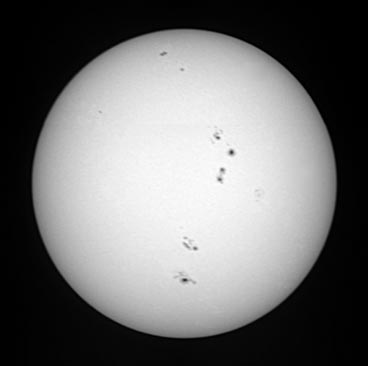Home - Astronomy- Photos - HAM Radio - Taiji Quan - Links
The Sun
Our local star
Home - Astronomy- Photos - HAM Radio - Taiji Quan - Links
Our local star
|
|
A very spotty Sun on February 26 , 2000 . The image is somewhat over processed in order to increase the visibility of the sunspots . It is possible to get an inkling of a facula at the upper left corner near the limb . |
Only a full disk image was taken this time , later some
telescopic images will come .
The image was stacked and combined with Robert Stekelenburg´s
AstroStack , a freeware program you can find on his Homepage
, then processed in Photoshop . Finally the image was reduced to half
size .
.
Next test of Solar images gave better results . The images
were made with a 80mm F7 refractor and the Astrovid 2000 provided with
a Hydrogen Alpha filter - NOT a Solar Prominence filter , simply a "nebula
filter" ,
recorded to a DV recorder .
Two AVI movies were fed into AstroStack (28 images each)
, then processed in Photoshop , simple Level setting and Brightness/Contrast
, followed by a modest amount of Unsharp Mask , then reduced to half size
.
Sunspots , 20-05-2000 approximately 1800UTC .

80mm F7 refractor , prime focus ,
Astrovid 2000 , Hydrogen Alpha filter .
Mosaic of 2 images .
The limb darkening as well as a bit of faculae (near the
limb) is visible on this image .
The result is much better than the
first attempt due to better adjustment of the monitor of the recorder .
The H-alpha-filter seems to reduce seeing problems as well as improve
the contrast of the sunspots .
a string of sunspots ....
New images recorded 10-07-2000
about 1800 UTC. Through some tiny gaps in the evening clouds I was taking
a look at the sun and saw an awful lot of them . Setting up my refractor
with the astrovid I got about 10 minutes of video with about half a minute
usable footage .Three images came from this adventure before the sun disappeared
bhind a tree as well as the clouds .
Sunspot group 10-07-2000 about 1800 UTC
80mm refractor @ F14 (using a Barlow x2)
Astrovid 2000 video camera
Hydrogen-Alpha filter with 10nm bandpass
A single video frame was used .
Only image processing was a histogram stretch .
Sunspot group 10-07-2000 about 1800 UTC
80mm refractor @ F14 (using a Barlow x2)
Astrovid 2000 video camera
Hydrogen-Alpha filter with 10nm bandpass
A single video frame was used .
Only image processing was a histogram stretch .
A string of sunspots ....
80mm refractor @ F14 (using a Barlow x2)
Astrovid 2000 video camera
Hydrogen-Alpha filter with 10nm bandpass
A single video frame was used .
Only image processing was a histogram stretch .
Sunspot group No 69 (10069) on August 17th 2002 @ 1630Z .
80mm refracxtor @ F14
Astrovid 2000 video camera
Wideband (10 nm) H-Alpha filter
Processed in IRIS with Wavelet and Unsharp Mask filtering
Processed in Photoshop with Unsharp Mask and Levels .
Since only single video frames are used and due to the attenuation of the
relatively narrow filter the images shown here are somewhat noisy (grainy)
. When the time comes The plan is to make a mylar solar filter with less
attenuation for Astrovid imaging only .
I just could not resist such a display despite the dismal conditions , and
I think the last image in particular was worth the effort .
AstroStack is an excellent program for stacking
video frames , the stacking time for 128 frames was about 20-25 minutes
, with Photoshop it would have taken me more than 2 hours just for the
stacking . In addition the program has provision for Unsharp Masking and
Deconvolution routines . Though the program has some limitations
it is such a time saver , and it has my best recommendation .
Solar X-rays:
![]()
Geomagnetic Field:
![]()
From n3kl.org